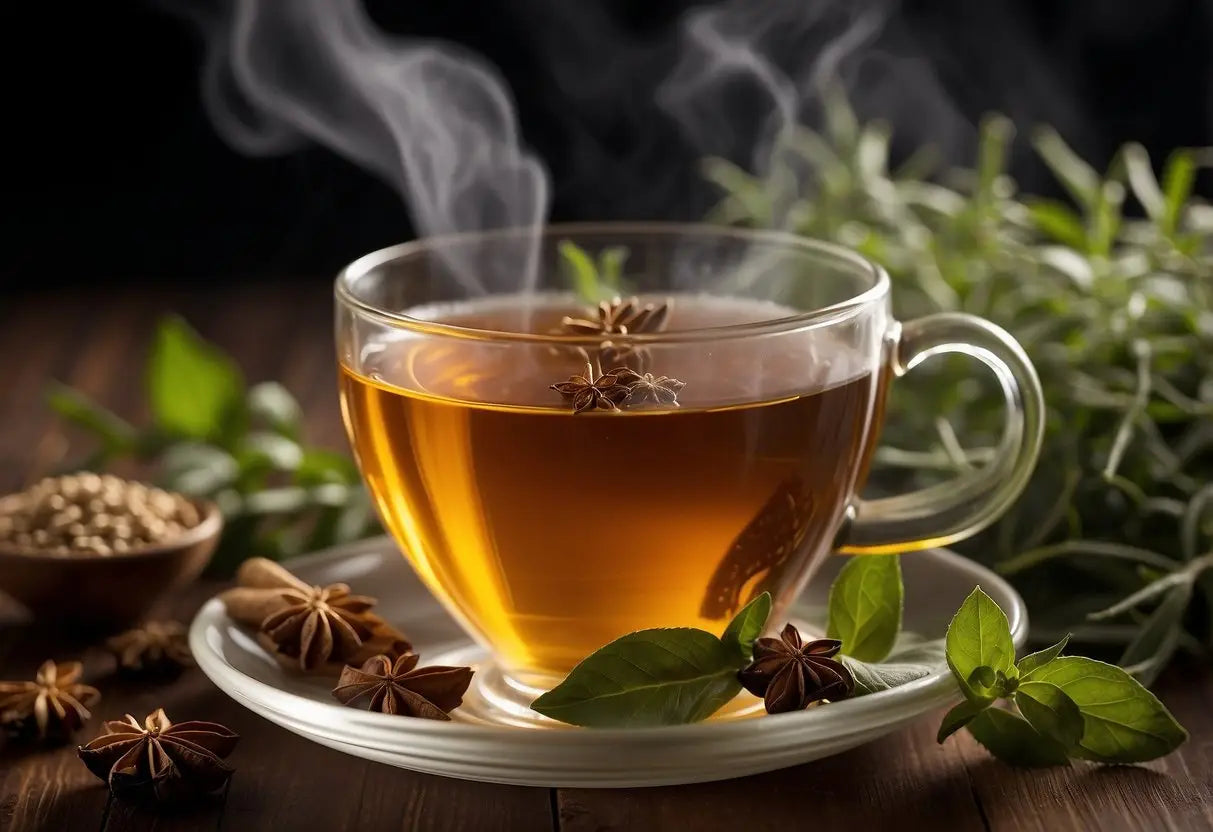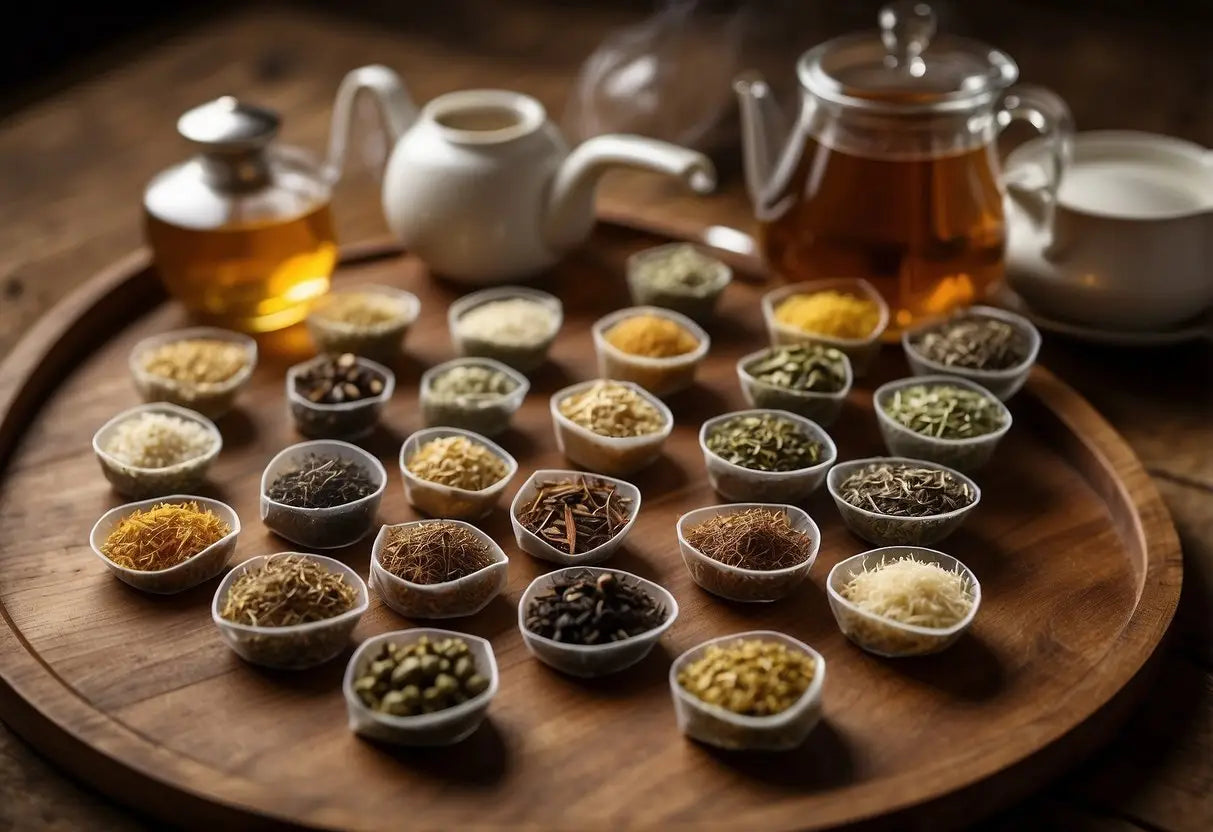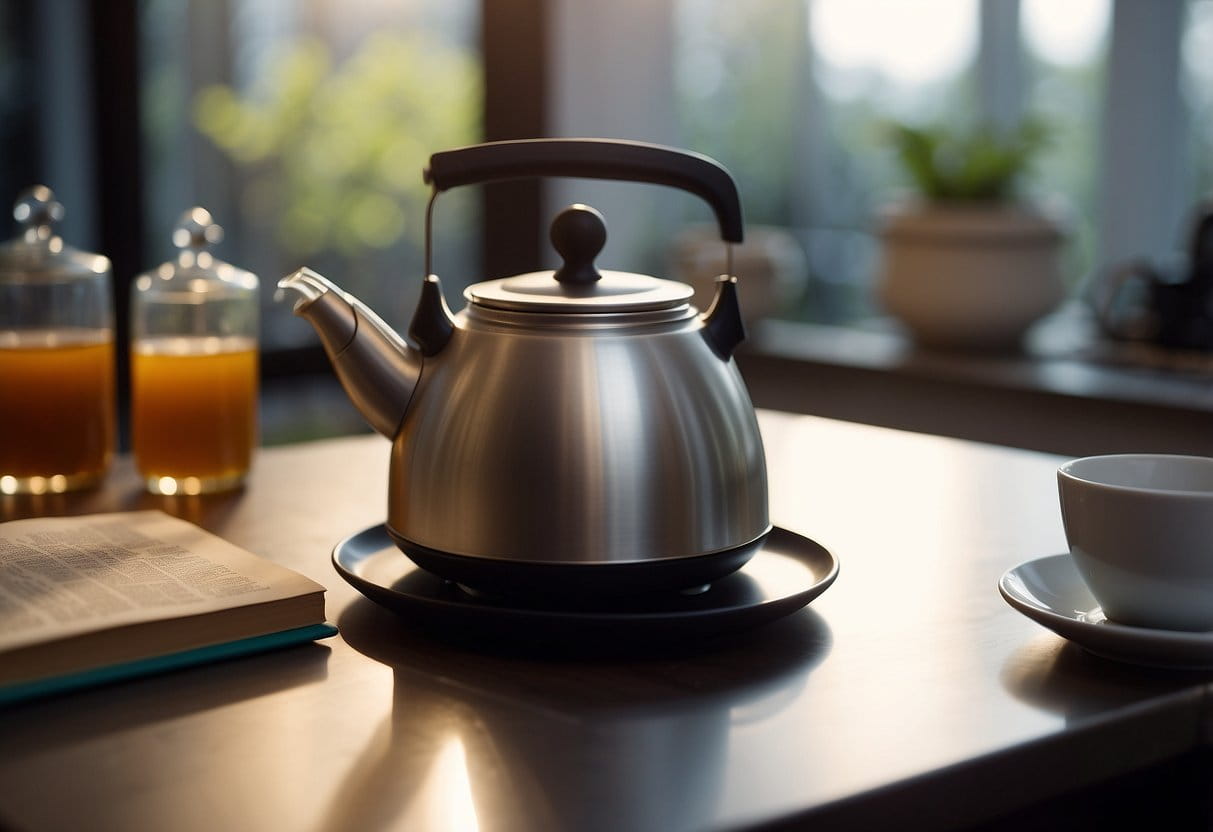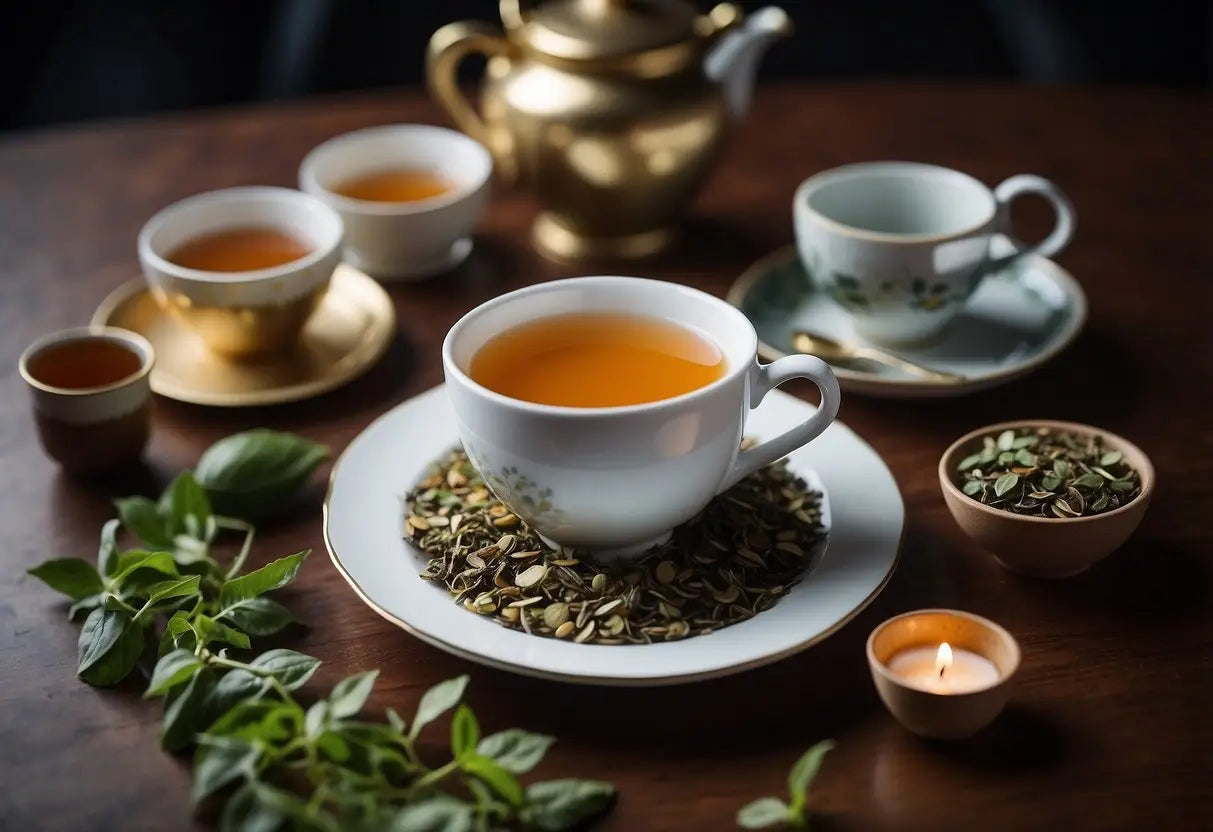Tea for Bloating
Bloating is a common digestive issue experienced by many people. It occurs when your abdomen feels full and tight, often due to gas or fluid retention.
Common Causes of Bloating:
- Diet: Foods like beans, lentils, broccoli, and onions can cause gas.
- Overeating: Eating large meals can strain your digestive system.
- Swallowing air: Drinking carbonated beverages or eating quickly can lead to swallowing air, resulting in gas.
- Food intolerances: Lactose or gluten intolerance can cause bloating.
Symptoms of Bloating:
Bestsellers
- Abdominal discomfort or pain
- Visible swelling of the abdomen
- Excessive gas
- Frequent burping or belching
Factors Contributing to Bloating:
| Factor | Description |
|---|---|
| Digestive disorders | Conditions like IBS or celiac disease can cause bloating. |
| Hormonal changes | Menstruation or pregnancy can lead to bloating. |
| Constipation | Slowed bowel movements can trap gas in your intestines. |
Understanding the specific causes of your bloating can help you manage this uncomfortable condition more effectively. Pay attention to your diet, eating habits, and overall lifestyle to pinpoint triggers.
The Role of Tea in Digestive Health

Tea can play an important role in supporting your digestive health. Different types of tea, particularly herbal and green tea, have properties that can help alleviate bloating and assist with overall digestion.
Herbal Teas for Bloating
Herbal teas such as peppermint, ginger, and chamomile are known for their digestive benefits. Peppermint tea contains menthol, which can relax gastrointestinal muscles and help relieve gas and bloating.
Ginger tea is renowned for its anti-inflammatory properties. It can aid in the digestion process by promoting the secretion of digestive enzymes. This can help reduce bloating and discomfort in your stomach.
Chamomile tea can soothe the digestive tract and has anti-spasmodic effects. It can relieve symptoms such as trapped gas and bloating. Drinking a cup of chamomile tea before bed can be particularly beneficial for nighttime digestion.
Green Tea's Effects on Digestion
Green tea contains catechins, which can improve your digestive health. Catechins are known to enhance the function of the gastrointestinal tract and improve nutrient absorption.
Green tea can also promote healthy gut bacteria. A balanced gut microbiome can lead to better digestion and reduced bloating. Polyphenols present in green tea have anti-inflammatory properties, which can further support your digestive health.
Drinking green tea after meals can help stimulate the digestive process, reduce bloating, and enhance overall comfort.
Types of Tea Recommended for Bloating

Several types of tea can help reduce bloating, with each offering its own unique benefits. The most common options include peppermint tea, ginger tea, and chamomile tea.
Lao Ban Zhang
Peppermint Tea Benefits
Peppermint tea is well-known for its soothing properties. Menthol, the active ingredient in peppermint, acts as a natural muscle relaxant, which can help alleviate the cramping and discomfort associated with bloating.
You may find relief by drinking peppermint tea after meals. It's particularly effective because it encourages the expulsion of gas from the digestive tract, reducing bloating and making you feel more comfortable.
Additionally, peppermint tea has anti-inflammatory properties, which further help in reducing digestive issues. It is also caffeine-free, making it a great option for those avoiding stimulants.
Ginger Tea Advantages
Ginger tea is another excellent choice for relieving bloating. Gingerol and shogaol, the compounds found in ginger, have powerful anti-inflammatory and antioxidant properties. These compounds enhance digestive enzyme activity, promoting smoother digestion and reducing gas buildup.
Drinking ginger tea stimulates saliva, bile, and gastric juices, aiding in the breakdown of food. This helps prevent the formation of gas and bloating.
Ginger is also effective in reducing nausea and can help soothe the stomach lining. For best results, consume ginger tea before or after meals.
Chamomile Tea Properties
Chamomile tea offers gentle relief from bloating. Its apigenin content assists in calming the stomach muscles, reducing spasms and contractions that often cause bloating.
This tea is particularly beneficial for those who experience bloating due to stress. Chamomile's calming effect on the nerves also translates to a more relaxed digestive system, helping prevent bloating caused by anxiety or tension.
Chamomile tea is also known for its anti-inflammatory and antimicrobial properties, which can contribute to an overall healthier digestive tract.
Feel free to enjoy it at any time of the day for its mild and soothing effects.
Preparation and Consumption Tips

To maximize the benefits of tea for bloating, pay attention to how you brew it and when you drink it. Proper brewing techniques and timing can significantly enhance its effectiveness.
Optimal Brewing Techniques
The temperature and steeping time vary depending on the type of tea. For example:
- Peppermint Tea: Steep at 212°F (100°C) for 5-10 minutes.
- Ginger Tea: Use freshly sliced ginger, boil it for 10 minutes, and steep for an additional 5 minutes.
- Chamomile Tea: Brew at 200°F (93°C) for 5-7 minutes.
Always use freshly boiled water. Avoid over-steeping, as this can make the tea bitter. Opt for loose-leaf teas when possible, as they offer richer flavors and more active compounds.
Best Times to Drink Tea for Bloating
Morning: Drinking ginger tea can stimulate digestion and reduce bloating throughout the day. Aim for 30 minutes before breakfast.
Afternoon: Peppermint tea is ideal after lunch. It aids in digestion and alleviates any bloating caused by heavy meals.
Evening: Chamomile tea before bed not only helps reduce bloating but also promotes relaxation and better sleep. Drink it 30 minutes before bedtime.
Adjust the timing based on your digestive schedule. If consuming tea on an empty stomach causes discomfort, pair it with a light snack.
Scientific Evidence Supporting Tea for Bloating

Certain types of tea have compounds believed to ease bloating. These teas often contain ingredients that may reduce gas and improve digestion.
Peppermint Tea
Peppermint has menthol, which may help relax the digestive tract. Studies suggest it can reduce bloating and discomfort.
Ginger Tea
Ginger contains gingerols and shogaols. These compounds can enhance digestion and reduce gas. Research shows ginger may be effective in relieving digestive issues.
Chamomile Tea
Chamomile has anti-inflammatory properties. It may help with digestive irritation and reduce symptoms of bloating.
Fennel Tea
Fennel seeds contain anethole. This compound can help relax gastrointestinal muscles. Studies indicate fennel tea might reduce bloating and improve digestion.
Green Tea
Green tea has catechins. These antioxidants can support digestion. Some studies suggest green tea helps reduce bloating.
Key Components and Their Benefits
| Tea Type | Key Component | Potential Benefit |
|---|---|---|
| Peppermint Tea | Menthol | Relaxes digestive tract |
| Ginger Tea | Gingerols, Shogaols | Enhances digestion, reduces gas |
| Chamomile Tea | Anti-inflammatory | Reduces digestive irritation |
| Fennel Tea | Anethole | Relaxes gastrointestinal muscles |
| Green Tea | Catechins | Supports digestion, reduces bloating |
You might consider integrating these teas into your diet to aid digestion and alleviate bloating.
Potential Side Effects and Interactions
Tea for bloating can offer relief, but it's important to be aware of potential side effects.
Common Side Effects:
- Stomach upset
- Headaches
- Dizziness
Possible Interactions:
- Medications: Some teas, like peppermint, may interact with medications for depression or high blood pressure.
- Supplements: Herbal teas can amplify the effects of certain supplements.
Allergic Reactions: Though rare, allergies to ingredients in herbal teas, such as chamomile, can occur.
Digestive Issues: While tea can alleviate bloating, it may also cause gas or diarrhea in some individuals.
When trying new teas, start with small amounts to monitor how your body reacts. Always consult your doctor if you have any concerns about interactions with your current medications or health conditions.
Other Natural Remedies Complementing Tea
Ginger is excellent for bloating. You can incorporate ginger into your diet by adding it to meals or drinking ginger tea. Its anti-inflammatory properties help in reducing bloating and discomfort.
Peppermint is another effective remedy. Consuming peppermint oil capsules or peppermint tea can relax the digestive system. This can alleviate the symptoms of bloating quickly.
Fennel Seeds can be beneficial as well. Chewing a few fennel seeds or drinking fennel tea can help with digestion and reduce bloating.
Probiotics can also support your digestive health. Including probiotic-rich foods like yogurt, kefir, or sauerkraut in your diet can balance your gut bacteria and reduce bloating.
A Warm Compress can relieve bloating. Applying a warm compress to your abdomen can soothe your digestive organs and alleviate discomfort.
Exercise is essential for preventing and reducing bloating. Simple activities like walking, yoga, or light stretching can help move gas through the digestive tract.
Hydration plays a crucial role. Drinking plenty of water aids digestion and reduces the likelihood of bloating.
Chamomile has calming effects on the digestive system. Drinking chamomile tea can reduce bloating and help you relax.
Dandelion Root acts as a mild diuretic. Drinking dandelion tea can help eliminate excess water and reduce bloating.
Incorporating these natural remedies can enhance the effectiveness of tea in reducing bloating. Consider combining them into your daily routine for optimal digestive health.
← Older post Newer post →











